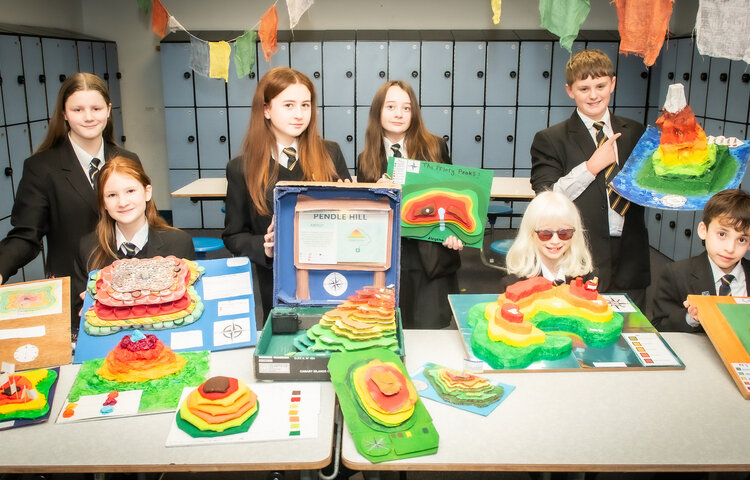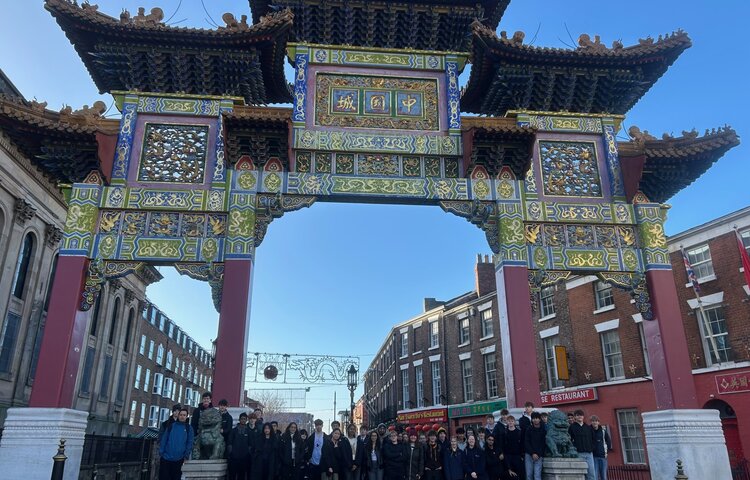Geography
Geography Intent 2023/24 (To be reviewed 2024)
At Penwortham Priory Academy, the discipline of Geography aims to inspire a curiosity and fascination about the world that they live in that should support students in their understanding of challenges that we will face in the future. We aim to build on prior learning at KS2 from our local primary schools – enriching their knowledge and understanding of OS maps, locational detail of the UK, differentiation between our physical and human world, the issues of food and water security and development dilemmas. Students should be given the opportunity to extend their locational knowledge of place and be allowed to explore relationships between people, place and processes that will, ultimately determine their place in the world at each distinct level from local to global and the impacts they have on their world. Understanding the key concept of sustainability and how to manage and plan for the future challenges to our local environment, the UK and our planet will be critical in such a dynamic world. As global temperatures rise and our biodiversity is eroded, we have a moral and real responsibility to ensure our future generations are exposed to a high quality, knowledge rich curriculum which will in turn, help shape the future of our planet. The solutions to the challenges we face will, inevitably, be dictated by our own children. ‘So many of the world’s current issues boil down to Geography, and need the geographers of the future to help us understand them.’ Michael Palin.
Our ultimate goal for students studying our curriculum is to develop students so that they can:
- Think like Geographers
- Speak like Geographers
- Write like Geographers
It is our intention that pupils become more expert as they progress through the curriculum, accumulating and connecting substantive and disciplinary geographical knowledge.
- Substantive knowledge - this is the subject knowledge and explicit vocabulary used to learn about the content
- Disciplinary knowledge – this considers how geographical knowledge originates and is revised. It is through disciplinary knowledge that children gradually become more expert by thinking like a geographer.
The intent of our curriculum is therefore for students to;
- Develop a rich, broad and balanced understanding of local and global geographical issues and processes that shape various regions of our Earth regardless of whether they are to end their study of Geography after KS3 or pursue it further into KS4 and beyond.
- Develop a passion and “sense of duty” within students to be environmentally responsible, compassionate, resilient and sustainable citizens.
- Have a sound understanding of our 8 key-concepts so they can confidently speak, think and write like a geographer.
- Be able to analyse geographical evidence and come to reasoned conclusions.
- Develop students that are ready for the intellectual step-up to KS4.
- Have the confidence and curiosity to ask questions and debate challenging/contemporary issues, within the world around them.
- Understand the past, present and future processes of human and physical geography (+how they are interconnected) that have shaped our planet until now and will continue to do so in the future.
- Simply; deepen students understanding of our planet.
To ensure our curriculum is taught to develop cumulatively sufficient knowledge by the end of the Geography journey, we follow the stages outlined below:
- Substantive knowledge for each subject is mapped through KS3 to ensure our children learn cumulatively sufficient knowledge to progress to KS4
- Disciplinary knowledge as geographical skills and fieldwork is mapped through KS3 to enable students to apply their knowledge as skills.
- Explicit teaching of vocabulary is central to student’s ability to connect new knowledge with prior learning. Teaching identifies Tier 2 words, high frequency words used across content e.g. verify, and Tier 3 words, specific to subject domains e.g. biome. This is carried out through a range of strategies, such as PiXl Unlock
- Spaced retrieval practice, through questioning, quizzes and peer-explanations, further consolidates the transfer of information from working memory to long-term memory. Low stakes testing coupled with interleaving tasks via assessment ensures that knowledge is firmly secured before progression
- Following Priory’s 7 Principles of Great Teaching & Learning to ensure that every learning encounter matters through creating the right culture, stretch and challenge, modelling, retrieval practice, assessment for learning, effective feedback and questioning
Why Geography Matters
Geography has the potential to change the perspective of how students see the world and influence their experiences e.g. understanding the layout of cities or how landscapes change over time. Throughout history, Geography has never been more relevant as we enter a new geological epoch; the Anthropocene where people are more aware of our impact on the planet than ever before. We are at a key crossroads in Earth’s history balancing further development of our economies and protection of our fragile ecosystems and combatting climate change, sea-level rise and environmental degradation. There has never been a more important time to learn about Geography.
Teachers of Geography
Mr P Metcalfe – Head of Humanities / Lead Teacher of Geography
Mrs L Kursitis – Teacher of Geography
Mr I Momoniat – Teacher of Humanities
Lessons
Year 7 – 2 x hours of Geography per week
Year 8 – 2 x hours of Geography per week
Year 9 – 2 x hours of Geography per week
Year 10 – 3 x hours of Geography per week
Year 11 – 3 x hours of Geography per week
Implementation
Geography Implementation Overview 2023/24
Our curriculum is underpinned by great teaching, following the 7 Principles of Great Teaching & Learning:
- Culture
- Stretch & Challenge
- Modelling with metacognition
- Practice & Retrieval
- Assessment for learning
- Feedback
- Questioning
This will be carried out in the following way:
- Clear overview of curriculum from Years 7 to 11 showing cumulative development of knowledge strands based on threshold concepts. Students will receive two hours per week in Years 7 to 9, with three hours per week at GCSE.
- Clear overview of curriculum within each key stage and each year, showing the sequence of learning.
- Shared and consistent lesson structures with accompanying resources.
- Coherent step-by-step sequences that build on existing knowledge and allow incremental development of knowledge.
- Access to broad and deep factual knowledge that allows them to use a range of thinking skills, including those that are deemed to be ‘higher order’ skills such as analysis and evaluation.
- Focus on learning – changes to long term memory – not performance. This will be implemented through the use of low stakes testing and interleaving.
- Explicitly teaching new tier two and tier three vocabulary
- Unrelenting focus on key concepts.
- Embedded regular retrieval practice such as interleaving technique and spaced practice
- Embedded and consistently applied homework focused on knowledge retrieval.
- ‘Close the gap’ by building and retaining long term knowledge in PP students.
Geography Curriculum Overview 2023/24
In Year 7 pupils are taught Geography for 2 hours per week, and cover the topics of:
- Geographical Skills
- The United Kingdom
- Weather & Climate (incl. fieldwork)
- All About Africa
- Economic Activity and Development
- Water & The UK
In Year 8 pupils are taught Geography for 2 hours per week, and cover the topics of:
- Plate Tectonics
- Population & Urbanisation
- Natural Resources
- Tourism (incl. fieldwork)
- Glaciation
In Year 9 pupils are taught Geography for 2 hours per week, and cover the topics of:
- Sustainable Living
- Crime (GIS)
- Extreme Environments
- Coasts
- Forests of The World
- Rivers
In Year 10 & 11 pupils are taught Geography for 3 hours per week, following the Edexcel Geography Specification A Syllabus.
In Year 10, pupils cover the topics of:
- Changing Cities (incl. fieldwork)
- Global Development
- Weather Hazards & Climate Change
In Year 11, pupils cover the topics of:
- UK Landscapes (incl. coasts & rivers)
- Ecosystems, Biodiversity & Management
- Resource Management
Geography Curriculum
Attainment and Progress (national tests and assessments)
2024 GCSE Geography Outcomes
|
Subject |
9 - 7 % |
9 - 5 % |
9 - 4 % |
|
Geography |
20 |
49 | 71 |
Destinations
House Competitions
The Geography Department run a series of competitions throughout the academic year. For example, for pupils in Key Stage 3 there is a contour island design competition, and a Geography General Knowledge Quiz competition for pupils in Key Stage 4. In collaboration with History and RE we ask pupils to participate in the Humanities reward postcard design competition.
Trips and Visits
The Geography Department offers trips at KS3 and KS4.
In Year 7, students visit their school grounds and local area of Penwortham to carry out fieldwork to build on their prior learning in class.
In Year 8, students visit The Lake District to supplement their learning around Tourism and Glaciation.
In Year 9, students visit the local deciduous woodland to explore the adaptations of flora and fauna.
In Year 10 and Year 11, as a compulsory part of their GCSE option, students visit Liverpool city centre to carry out urban fieldwork. They also visit the river Wycoller in Colne to carry out their own investigation. In Year 11, students visit Morecambe and Heysham to further consolidate their understanding of coastal defenses. We also offer an optional Year 11 revision weekend to Helmsley in Yorkshire.
In addition to these curriculum visits, the Geography department offer additional trips and visits. These may include:
- Sorrento/Naples – Italy
- Reykjavik – Iceland
- The Eden Project - Cornwall
Guest Speakers and Workshops
In 2024/25 there are planned workshops to be delivered by Timberplay and Urban Change, Preston. Timberplay will deliver workshops to groups of students, exploring career opportunities in geological design and construction to build exciting playground areas for young people. Such a career needs foundation understanding of geology and space. In addition, Urban Change will run workshops and seminars introducing your students into the challenges of urban design in the 21st century. As an ever-growing population poses challenges and pressure on housing and space, Urban Change work to solve these problems in our city centres.
Volunteering Opportunities
Pupils will have the opportunity from September 2024 to become librarians for the Humanities Library.
Cultural Experiences
As part of the trips and visits we offer, on each trip occasion we aim to visit Sites of Special Scientific Interest to ensure students appreciate the importance of the world we live in. One such example is our trip to The Lake District, and Pompeii, Italy. In addition, the visit to Iceland Thingvellir National Park in the Golden Circle is a protected area, and a visit to the capital city of Reykjavik affords students the opportunity to experience local culture, cuisine and customs.
Clubs
In Geography we offer a lunchtime Geography club. Currently compromising of around 12 students, the aim of the club is to allow students to pick areas and themes of the discipline that may not necessarily be part of the taught curriculum. Students pick themes to explore during their time in the club, debating topical issues such as Global Warming and Climate Change and using the IT facilities to look at GIS and generate quizzes to expand their Geography knowledge.
Where can studying Geography take you?
Related News
Year 7 Impress Geography Teachers with Their Contour Models
Year 7 was given a project by geography teachers to create a 3D contour model of a landscape.
Sacred Places to Shopping Spaces; Year 11 Take Liverpool by Storm
Our cross-curricular Religious Education and Geography visit to Liverpool.


